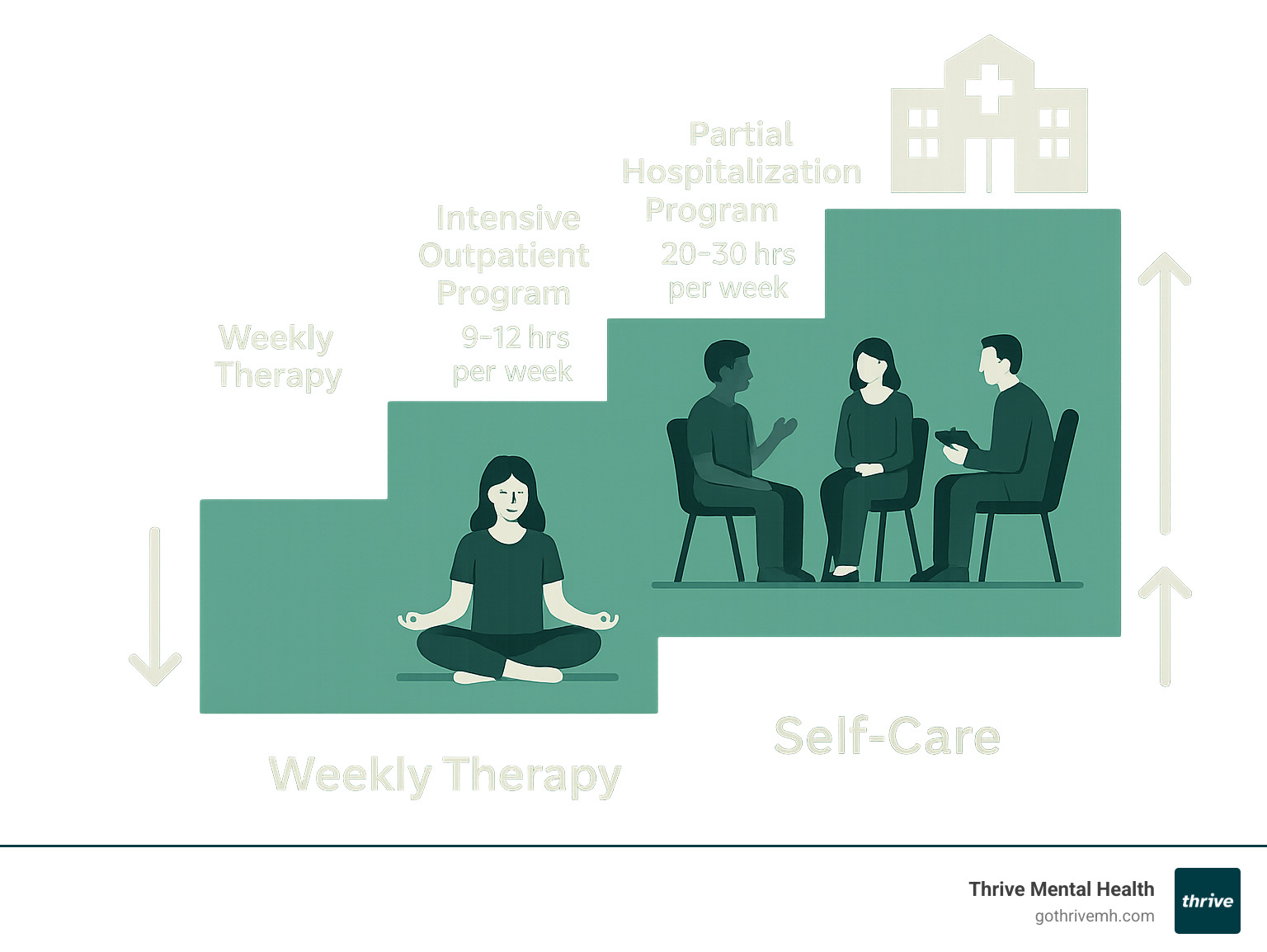The Grown-Up Guide to Adult Outpatient Mental Health Programs

Why Adult Outpatient Mental Health Care Is Essential for Your Recovery Journey
Adult outpatient mental health services offer professional treatment that fits into your life. Unlike inpatient programs, outpatient care allows you to live at home and maintain your daily responsibilities while attending therapy, managing medication, and participating in support groups.
Quick Overview of Adult Outpatient Mental Health Options:
- Traditional Therapy: Weekly individual sessions (1-2 hours per week)
- Intensive Outpatient Programs (IOP): Structured group and individual therapy (9-12 hours per week)
- Partial Hospitalization Programs (PHP): Daily programming with intensive support (20-30 hours per week)
- Virtual Care: All levels available through secure telehealth platforms
- Specialized Programs: Dual diagnosis, trauma, eating disorders, and identity-affirming care
Mental health is a journey, and you don’t have to steer it alone. Whether you’re dealing with anxiety, depression, or stepping down from a higher level of care, outpatient programs provide the flexibility you need. You can apply new skills in your actual environment while building a support network that understands your challenges.
Research shows that structured outpatient care is highly effective, with options ranging from weekly therapy to intensive daily support. Virtual care further eliminates travel and scheduling conflicts. At Thrive Mental Health, we’ve seen how the right level of care, delivered where you are, can transform lives.

Understanding the Landscape of Adult Outpatient Mental Health
Adult outpatient mental health services support individuals who need professional help but can live at home and manage daily responsibilities. Unlike inpatient care, which requires residing in a facility, outpatient treatment offers a structured transition for those stepping down from a higher level of care or for those with mild to moderate symptoms who have a stable living environment.
Our approach is to tailor treatment to your specific needs, integrating care seamlessly with your routine. This helps you build resilience and coping skills in the environment where you’ll use them most. To learn more, explore our Comprehensive Guide to Behavioral Health Services.

What are the benefits of adult outpatient mental health care?
Choosing adult outpatient mental health care empowers you to reclaim your life while receiving high-quality treatment.
- Flexibility: Continue living at home, working, and caring for family without putting your life on hold.
- Real-Time Application: Immediately apply coping strategies learned in therapy to real-world situations, reinforcing new, healthier behaviors.
- Less Restrictive: Maintain your independence and privacy in a less restrictive setting than inpatient care, fostering autonomy in your recovery.
- Cost-Effective: Outpatient programs are generally more affordable than inpatient stays, making quality care more accessible.
- Community Building: Group therapy in programs like IOP and PHP fosters connection with peers, reducing isolation and building a strong support network.
Find more about structured outpatient care in The Benefits of an Intensive Outpatient Program.
Who is eligible for these services?
Eligibility for adult outpatient mental health services is determined through a comprehensive assessment. Ideal candidates are typically adults 18 and older who:
- Have a diagnosis of a mental health condition like depression, anxiety, or PTSD.
- Experience functional impairment in work, relationships, or self-care but do not require 24/7 supervision.
- Are motivated to participate actively in their treatment.
- Have a safe and stable living environment.
We also serve individuals with a dual diagnosis (co-occurring mental health and substance use disorders) who can benefit from our structured, flexible approach.
Levels of Care: From Weekly Therapy to Intensive Programs
Adult outpatient mental health care is a flexible continuum, allowing you to step up or down in intensity based on your needs. This ensures you are always in the most effective, least restrictive environment. As you develop stronger coping skills, you can transition to less intensive care while maintaining your progress.
Here’s how the different levels compare:
| Feature | Traditional Outpatient Therapy | Intensive Outpatient Programs (IOP) | Partial Hospitalization Programs (PHP) |
|---|---|---|---|
| Hours per Week | 1-2 hours | 9-12 hours | 20-30 hours |
| Session Types | Primarily individual therapy; occasional group | Group therapy focused; individual & family therapy | Daily structured programming; group, individual, family, psychoeducation |
| Ideal Candidates | Mild to moderate symptoms; stable functioning; ongoing support | Need more than weekly therapy; can maintain daily routines; stepping down from higher care | Need intensive support to avoid inpatient stay; stepping down from inpatient; severe functional impairment |
Traditional Outpatient Therapy
This is the foundation of adult outpatient mental health care, involving weekly or bi-weekly one-hour sessions with a therapist. It’s ideal for managing specific issues like work anxiety or life transitions while functioning well overall. Many combine this with medication management for comprehensive care, and it can be a sustainable, long-term form of support.
Intensive Outpatient Programs (IOP)
When weekly therapy isn’t enough, an IOP provides 9-12 hours of therapy per week, typically over three days. The focus is on group therapy, supplemented by individual and family sessions, allowing you to build practical skills while maintaining work or family duties. IOPs are ideal for managing more disruptive symptoms or as a step-down from higher levels of care. Learn more in A Comprehensive Guide to Intensive Outpatient Programs.
Partial Hospitalization Programs (PHP)
PHP is the most intensive level of adult outpatient mental health care, offering 20-30 hours of programming per week without an overnight stay. It’s designed to prevent inpatient hospitalization or to provide a structured transition from it. This level of care is for those whose symptoms significantly impact daily functioning but who have a stable home environment. For more details, read PHP vs. IOP: Understanding Levels of Care.
What to Expect: Treatments and Services Offered
In adult outpatient mental health services, your care begins with an Individualized Treatment Plan (ITP), a personal roadmap to wellness built around your unique goals. You’ll work with a multidisciplinary team—including therapists, psychiatrists, and case managers—who collaborate to provide coordinated, comprehensive care.
This team approach ensures all aspects of your well-being are addressed, from emotional work in therapy to medication management and community resource connection. To learn more about the experience, see What to Expect in an Intensive Outpatient Program.

Core Therapies and Modalities
Treatment is grounded in evidence-based therapies to build lasting resilience.
- Individual therapy provides one-on-one time to process personal issues and develop coping strategies.
- Group therapy offers a powerful connection with peers, reducing isolation and allowing you to learn from shared experiences.
- Family and couples counseling helps improve communication and build stronger support systems at home.
- Psychoeducation empowers you with knowledge about your condition, triggers, and management strategies.
- Cognitive Behavioral Therapy (CBT) helps you identify and change negative thought patterns.
- Dialectical Behavior Therapy (DBT) teaches practical skills for mindfulness, distress tolerance, and emotional regulation.
Learn more about these approaches in Navigating Intensive Outpatient Therapy: The Roles of CBT and DBT Explained.
How Medication Management Works
Medication can be a game-changer for managing symptoms and is approached thoughtfully and collaboratively. The process includes a psychiatric evaluation, careful prescription and monitoring to optimize effectiveness while minimizing side effects, and regular follow-ups. Your therapist and medication provider work together, ensuring your medication supports your therapeutic goals. For general coverage information, you can visit Medicare.gov, but always verify your specific benefits.
Specialized Outpatient Programs
Our adult outpatient mental health services include specialized programs for specific needs.
- Dual diagnosis programs simultaneously address co-occurring mental health and substance use disorders.
- Trauma and PTSD programs provide a safe, trauma-informed environment for processing difficult experiences.
- Eating disorder programs address the complex psychological and behavioral aspects of these conditions.
- Programs for veterans recognize the distinct challenges faced by military members and their families.
- LGBTQIA+ affirming care ensures you receive treatment in a culturally responsive environment that celebrates your identity.
How to Access Adult Outpatient Mental Health Services
Taking the first step toward adult outpatient mental health care is a sign of strength. Getting started is straightforward: you can contact a provider directly through self-referral or get a physician referral from your doctor. You are in control of your healing journey from day one. For an inspiring perspective, read about My Experience with an Intensive Outpatient Program: A Personal Journey.
The Intake and Assessment Process
Once you reach out, a thoughtful process ensures we find the best path for you. It includes:
- Initial Phone Screening: A friendly conversation to listen to your concerns and answer questions.
- Biopsychosocial Evaluation: A comprehensive assessment of your biological, psychological, and social factors to see the full picture.
- Determining the Right Level of Care: Our team recommends the most effective, least restrictive care level (e.g., traditional therapy, IOP, or PHP).
- Collaborative Treatment Planning: You become a co-author of your recovery, creating an Individualized Treatment Plan (ITP) with your goals and strategies.
Navigating Insurance and Payment in Florida
Understanding payment for adult outpatient mental health services is key. In Florida, we are committed to making care accessible.
- Verify Your Benefits: Call your insurance provider to ask about deductibles, co-pays, and pre-authorization for programs like IOP or PHP.
- In-Network vs. Out-of-Network: We are in-network with many major insurance providers, including commercial plans and Florida Medicaid, which typically means lower out-of-pocket costs for you.
- State Resources: We accept Florida Medicaid in applicable programs to reduce financial barriers.
For more on insurance for our virtual programs, see our Virtual IOP Insurance page.
Finding a Program Near You
Connecting with quality care in Tampa Bay, St. Petersburg, or Central Florida is achievable. Here are some reliable methods:
- Use national directories like FindTreatment.gov.
- Ask your insurance provider for a list of in-network facilities.
- Seek a referral from your primary care physician.
- Search online for “adult outpatient mental health Florida” or “IOP programs near me Florida.”
Finding the right fit is crucial. For more guidance, explore our guide on Finding Quality IOP Programs Near Me: A Guide.
The Rise of Virtual Care: Telehealth and Online Programs
Virtual care has transformed adult outpatient mental health, breaking down barriers to treatment. Using secure, HIPAA-compliant platforms, you can now access expert care from home, eliminating challenges like traffic, childcare, and travel time. For clients across Florida, from Tampa Bay to small rural towns, distance is no longer an obstacle to receiving high-quality, expert-led care.
Virtual programs maintain clinical excellence while adding convenience and comfort, opening doors for many who previously struggled to access treatment. See for yourself How Virtual Intensive Outpatient Programs Are Revolutionizing Mental Health Care.

Benefits of a virtual adult outpatient mental health program
Virtual adult outpatient mental health care is therapy that fits your life.
- Accessibility from anywhere in Florida: Your zip code no longer determines your access to specialized care. Connect with licensed professionals from anywhere in the state.
- Flexible scheduling: With morning, midday, and evening options, you can commit to treatment without rearranging your life.
- Privacy and comfort of home: Being in your own familiar space can help you engage more deeply in the therapeutic process.
- Consistent care: Even if you move or travel, your treatment can continue without interruption, maintaining momentum in your recovery.
Our Virtual Intensive Outpatient Programs prove that you can have both convenience and quality in your mental health care.
Frequently Asked Questions about Adult Outpatient Mental Health
It’s natural to have questions when considering adult outpatient mental health care. Here are answers to some of the most common ones.
How long does an outpatient program last?
Program length varies based on your individual needs and progress. Intensive programs like IOP and PHP are often short-term, typically lasting 9-12 weeks, while traditional therapy can be ongoing for long-term wellness. Your treatment plan is custom to your goals, and decisions about graduating or stepping down to a different level of care are made collaboratively with your treatment team.
Can I switch therapists if it’s not a good fit?
Yes. The relationship with your therapist—the therapeutic alliance—is crucial for success. We understand that finding the right fit is important. If you feel your therapist isn’t the right match, we encourage open communication. Speak with a program coordinator, and we will help you find a provider who better suits your needs without disrupting your progress.
What happens after I complete a program?
Completing a program is a major accomplishment, and we ensure you have a plan for what’s next. Aftercare planning is essential and begins well before you graduate. This often includes:
- Stepping down to a lower level of care, such as moving from a PHP to an IOP or from an IOP to weekly therapy.
- Joining alumni programs for ongoing peer support, often available virtually.
- Connecting with community support groups like NAMI or DBSA for continued wellness.
- Ensuring continued medication management with a clear plan for ongoing psychiatric care.
The goal is to empower you with the tools to thrive independently, knowing support is always available.
Conclusion: Taking the First Step Towards Wellness
Your mental health journey doesn’t have to be traveled alone. Adult outpatient mental health services offer a flexible, effective bridge to wellness, providing professional support that integrates with your daily life. You learn and apply skills in your real-world environment, making recovery more sustainable.
Recovery is possible. Through evidence-based care that meets you where you are, you can transform your relationship with anxiety, depression, and other challenges. The rise of virtual care has made this support more accessible than ever, removing barriers of distance and scheduling.
At Thrive Mental Health, we provide expert-led, evidence-based IOP and PHP programs custom to your needs. Whether you’re in Tampa Bay, St. Petersburg, or anywhere in Florida, our virtual and in-person options are designed to support your wellness journey.
The hardest part is often taking the first step. When you reach out, you’ll find a team ready to help you build the resilience to thrive. Your healing starts with the decision to seek support. We invite you to learn how we can improve your mental health support today. You deserve care that works with your life.